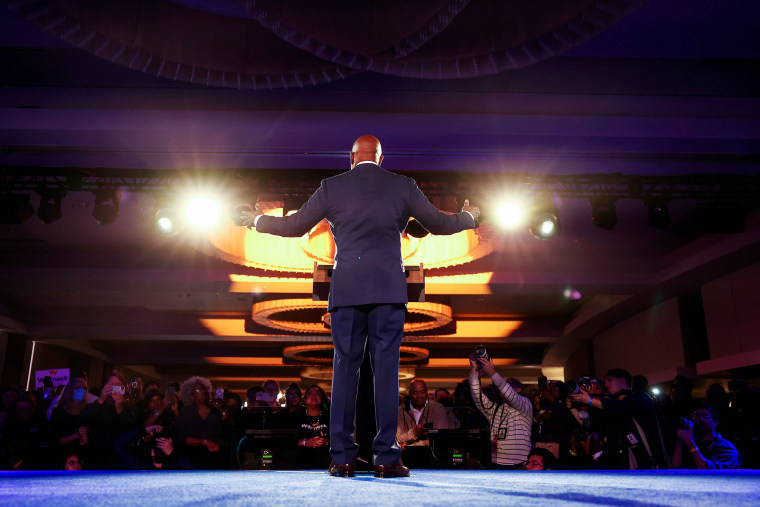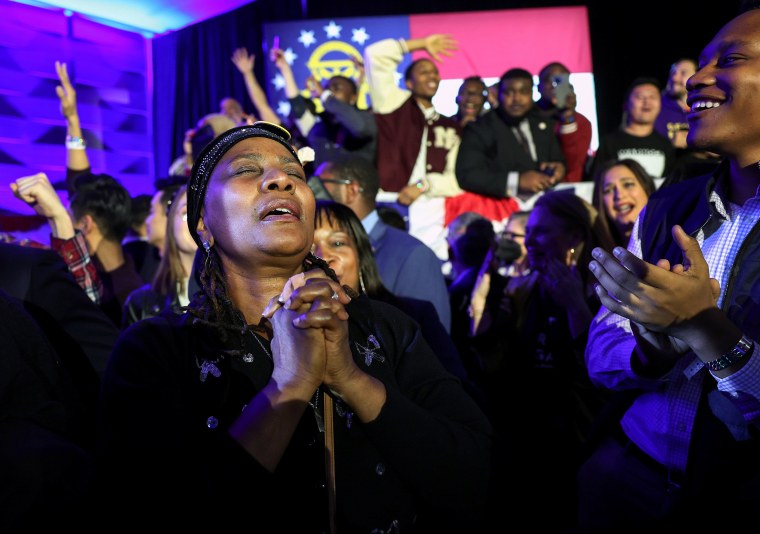ATLANTA — The morning after the Senate runoff election between incumbent Democrat Raphael Warnock and Republican nominee Herschel Walker brimmed with relief and satisfaction for many Black Georgia voters, who were essential in clinching the win for Warnock on Tuesday.
But their sense of accomplishment didn’t just come from Warnock’s win. It came from their perceived success in overcoming what they viewed as voter suppression efforts by Republicans, in the form of the Election Integrity Act of 2021, which established new voter guidelines. After the 2020 election — when Joe Biden defeated Donald Trump, in part by winning Georgia, and Warnock and fellow Democrat Jon Ossoff were elected to the Senate — Georgia Republicans passed bill SB 202, which approved the rollout of contentious voting mandates in Georgia.
The new guidelines included shortening the turnaround for runoffs to four weeks, from eight, which meant long lines because there would be only one week of early voting and no opportunity to register and cast ballots before a runoff. Warnock’s campaign successfully sued the state over the mandate and won an extra day, Saturday, Nov. 26, for early voting.
“It backfired on them,” said Cam Sanders, a Georgia voter who lives in suburban Atlanta. “And you know when I knew that it would? When the bill first passed. Everyone I talked to about it was really mad in a way like, ‘I’m going to prove you wrong. You won’t stop us.’ And that’s what happened. We didn’t let it stop us.”

In his speech after the race was called Tuesday night, Warnock talked of the new voting guidelines, saying: “Let me be clear. The fact that millions of Georgians endured hours in lines — and were willing to spend hours in line — lines that wrapped around buildings and went on for blocks, lines in the cold, lines in the rain, is most certainly not a sign voter suppression does not exist. Instead, it is proof that you, the people, will not allow your voices to be silenced.”
The voice of Black Voters Matter co-founder Cliff Albright was hoarse Wednesday morning. He and countless Warnock supporters celebrated well into the night — after four weeks of grinding to make sure Black voters exercised their right to vote in the face of obstacles. Albright said he was tired, but ultimately fulfilled.
“Voter suppression was an issue, even if it wasn’t a completely successful issue,” Albright said. “In other words, it may not have worked, but it sure had an impact. We know it was harder to vote for some Black voters. We know squeezing what should have been three weeks of early voting into one week represented.”
In counties around Atlanta, which have the largest Black demographics in the state, Warnock crushed it. He earned 76.5% of the vote in Fulton County, which is mostly Atlanta; 86.7% in DeKalb County; 59.6% in Gwinnett; and 62.1% in Cobb County, according to NBC News runoff results. Overall, Warnock received 86% of the Black vote in the state.
Albright said the “turnout was still pretty good for a runoff election,” although he acknowledged that “voter suppression” did affect some voters. He said he encountered voters who had trouble receiving their mail-in ballots and that “people were being redirected on where to submit their provisional ballots.”
But, Albright said, voters need to be sober about Warnock’s win and what that says about voter suppression. “Black voters are taking pride and celebrating, and they should,” Albright said. “But we’ve just got to walk a fine line between recognizing our success and the words that we’ve come to almost hate — our resilience — without people buying into the narrative that Warnock won, therefore there was no voter suppression. We have to have a nuanced view and analysis of what this turnout means.”
Unlike Albright, Selena White, who attended Warnock’s election victory party at the Marriott Marquis hotel, did not feel the need to temper her words about the Warnock win.
“Republicans forced those suppression laws down our throats and now they have to choke on them,” said White, a marketer at a computer company. “They messed up two ways: They tried to make it hard for us to vote. All that did was make us more determined to vote. They think we don’t value what it means to vote, that we’d just say, ‘Forget it,’ if it wasn’t easy or convenient."
She believed that Walker was used by conservatives to get the Black vote. They put him “up there and think because he’s Black and had some name recognition, we would fall for him. Never mind if he was qualified, which he wasn’t. That’s the insulting part of this.”
Walker’s campaign was laced with controversy, including claims that he had threatened to kill his ex-wife; that he had impregnated women and paid for their abortions, although he ran on an anti-abortion campaign; questions about his cognitive viability; and accusations that he consistently stretched the truth. He repeatedly denied the abortion claims and insisted he was equipped to serve as Senator, despite several gaffes.
“And they wanted Black people to vote for that?” White said.
Albright agreed, adding that the fact that Walker fared so poorly with Black voters spoke to their interest in supporting the strongest candidate. “It was almost universal among Black people, a sense of indignation, that white Republicans and some white media believed we would split the vote just because there was a Black man running opposite Warnock,” he said. “People were really insulted by that.”
“I’ve voted Democrat all my life,” said Roland Samuel, 69, a retired electrician in southwest Atlanta. “Most Black people do. But … it was about who we are as voters. … Showing up at the polls was more than beating voter suppression. It showed we care.”
The robust Black vote also showed a level of erudition, Albright said, defying some myths that Black voters don’t understand, or thoroughly consider, the issues when voting.
“If we were as unsophisticated as some would have you believe, then you would see Walker get maybe 30% of the vote,” he said. “To get that high a number would mean some segment of the Black community was just so confused and unsophisticated that it was willing to vote for any old Black person. … So, Black voters overcame a lot — and showed they are smart voters, too.”

